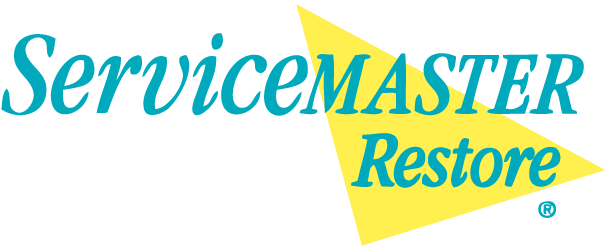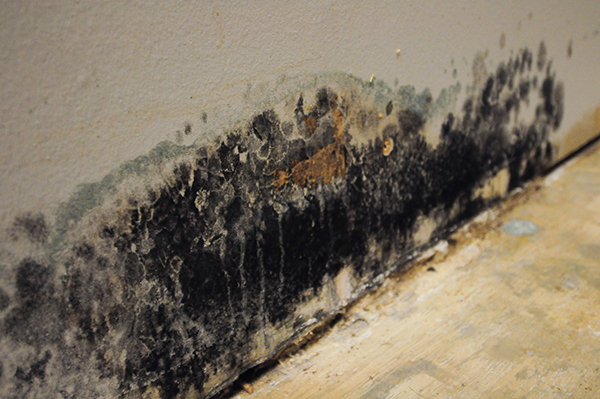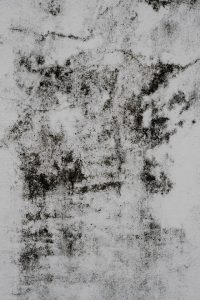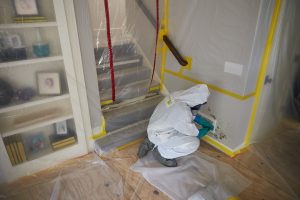Stachybotrys chartarum is a type of mold. Black molds, like S. charatarum, can develop inside a home that has sustained water damage. In Chicagoland, black mold can flourish within hours, depending on its nutrient source (the material it feeds on) and the level of moisture available.
Black mold spores, like any other mold types, are abundant throughout the natural environment. Airborne spores meander through the air, sometimes making their way indoors. When the spores land on organic materials indoors and are fed by a consistent water source, the black mold flourishes.
Warmth, humidity, and dampness are ideal conditions for black mold growth. In Chicagoland, such conditions are frequent during the blistering summer months. In fact, summertime is when mold colonies spread the fastest. Hot, humid Chicagoland homes are the perfect breeding grounds for mold.
Chicagoland winters are not immune to black mold, either. Mold does not have the ability to grow in subfreezing temperatures. However, the spores patiently lay dormant, waiting for the thaw of Chicagoland’s spring to return to life and thrive. Damp households revitalize dormant mold.
When indoor conditions are optimal, mold grows all year round in Chicagoland. While typically dry and well-maintained homes see few mold colonies, residences that sustain unanticipated and unaddressed water damage have a high risk for developing a nasty black mold infestation.
What are ideal conditions for mold growth?
As mentioned, moisture is a critical food source for hungry black mold spores. Organic materials round out the spores’ nutritional diet. Drywall, insulation, wood, and similar porous building materials serve as reliable, organic food sources, especially when combined with consistent moisture.
As the spores digest the organic materials, the surfaces on which the mold colonies feed are destroyed. Remaining unsatiated, the spores spread to adjacent organic materials, continuing on a path of destruction. A mold-infested home will readily undergo significant structural damage.
What types of water damage facilitate mold?
In Chicagoland homes, various types of water damage can lead to mold growth. Water damage may be the disastrous outcome of flooding, plumbing leaks, roof leaks, damp crawl space, humid basement, overflows from a bathroom tub or sink, and the high humidity from steam cooking in a kitchen.
Considering that moisture lingers after a water damage incident, mold growth will readily make its ugly appearance. Chicagoland homeowners who fail to immediately clean up the water damage will quickly be faced with the additional problem of toxic black mold infestations.
How quickly does black mold appear?
Chicagoland homeowners may be unnerved to know that black mold can emerge within a mere 24 to 48 hours after the spores are exposed to moisture. Remember that the stealthy spores lay dormant. When moisture conditions are ripe, such as after water damage, the spores quickly begin to revive.
Worsening the black mold problem is the fact that these spores will continue to rapidly spread until the moisture source is fixed. For Chicagoans, this may mean sealing the roof leak, resolving the plumbing leak, running dehumidifiers in the basement or utilizing a water damage cleanup service for flooding.
How is black mold detected?
Homeowners who fail to immediately clean up water damage can expect mold growth. Black mold may be detected in various ways. A visual inspection of water damaged areas can point to discoloration. The walls and ceilings, for example, may be riddled with dark, black splotches—indications of black mold.
Black mold may also be detected by the olfactory sense. Smelling a damp, earthy or foul stench in certain parts of the interior home is a clear indication that black mold has taken hold. Some people liken the unpleasant smell of mold to old, dirty socks.
How is black mold eliminated?
When Chicagoland homeowners see or smell black mold, the first response should be to identify and stop the source of moisture. Next, assess the extent of mold growth. If the black mold infestation is greater than 25 square feet, consult a professional mold remediation company for cleanup.
Mold colonies less than 25 square feet may be resolved by the homeowner. The homeowner will need equipment, such as chlorine bleach, a mop, wet/dry vac, and trash bags. Plus, safety gear, like a respirator mask and rubber gloves, will be necessary as protection against the airborne spores.
Adequate ventilation is a must when beginning a mold cleanup task. All hard surfaces, including metal, glass, and wood, should be washed with detergent. Once the cleaning is done, disinfect the surfaces with a bleach solution, allowing the bleach to remain on the materials for ten minutes prior to rinsing.
Porous materials affected by black mold, such as bedding, furniture, clothing, and carpeting, may have to be discarded. If the contaminated soft goods have been wet for less than 48 hours, it is possible to clean, disinfect, and salvage them. When in doubt, however, toss out the contaminated items.
Never invite toxic black mold into the home. Repair all water damage promptly and ventilate damp spaces. Despite efforts to prevent black mold, the spores can quickly move in. When faced with a mold infestation, call the mold remediation experts at ServiceMaster S&R Systems.
The experienced technicians at our highly rated mold cleanup company are skilled in identifying mold growth, even those hidden behind walls. We use proven techniques and safe cleaning products to eliminate the infestation and prevent the spores from contaminating other parts of the home.
Materials permanently damaged by mold growth are carefully removed, so as not to disperse the spores into the immediate environment. Interior mold-damaged spaces are thoroughly cleaned. Restoration services are provided to return the mold-damaged areas to a hygienic, mold-free condition.
An extensive case of mold is an emergency that requires the expertise of ServiceMaster S&R Systems. It is critical to avoid the delay of mold remediation services. As soon as you detect mold in your Aurora, Joliet or Naperville, Illinois, home, call us for high quality mold remediation services.



